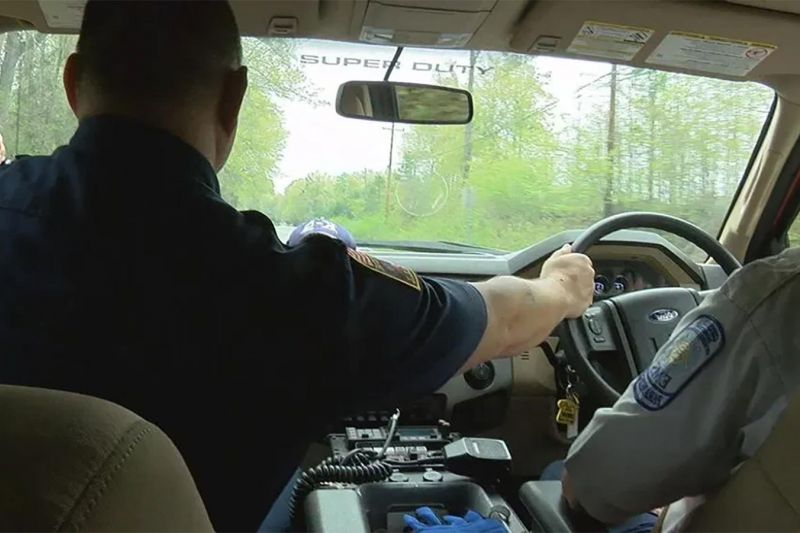You’ve probably seen it in movies, TV or maybe even in person – when a driver asks their front-seat passenger to ‘hold the wheel’ while they attend to something that’s apparently more important than controlling tonnes of metal hurtling along a highway.
- A driver’s responsibility is to be in control of the vehicle at all times
- Taking your hands off the wheel is permissible to a degree
- Letting a passenger steer the car is illegal
Whether you’re just taking your hands off the wheel to sort out that sloppy burger you’re trying to eat, or to reach under your chair to get something you dropped, or – heaven forbid – to do something on your phone or computer, you could get in big trouble for letting someone else take over the steering.
Australian Road Rules as at June 2023 state, under Reg 272, “Interfering with the driver’s control of the vehicle” is an offence where: A passenger in or on a vehicle must not: (a) interfere with the driver’s control of the vehicle; or (b) obstruct the driver’s view of the road or traffic.
Now, that’s potentially a very different situation – if an unruly co-driver yanks the wheel away from your hands, they could be charged with something much more severe than if you’d asked them to hold the wheel while you do something else. Of course, in a medical emergency for the driver, the passengers will need to take control as best they can.
We asked a former highway patrol officer what their take on that sort of offence was, and they said an officer would “need some additional evidence” such as seeing a car weaving in a marked lane, or a peculiar driving behaviour being observed for a significant amount of time.
The new all-seeing, all-knowing cameras that are being rolled out across the nation that can penalise drivers for mobile phone use and seatbelt offences may just play their part in this kind of case, too.
So, what kind of penalties are we talking about? In theory, it will boil down to the officer and their jurisdiction, but the broader provision would be “lack of control” of the vehicle or “fail to exercise proper control”.
That is Reg 297 in the Australian Road Rules – “Driver to have proper control of a vehicle etc”, which states: “(1) A driver must not drive a vehicle unless the driver has proper control of the vehicle.”
Western Australian statistics claim that 77 per cent of people killed or seriously injured were in crashes that did not involve primary risk-taking behaviour – that means more than three-quarters of those people were NOT “speeding, drunk driving, non-wearing of seatbelts or helmets”.
This means that driving distracted or not paying due attention to the road has a significant road trauma impact, not just in WA but all Aussie locales.
Policy makers generally refer to four main types of distraction: manual distraction, which is the one we’re focusing on in this story, refers to “tasks that require the driver to take a hand (or both hands) off the steering wheel and manipulate a device,” while others include visual, cognitive, and auditory.
These rules are seemingly pretty open to interpretation in terms of what you may be punished for, if caught. I guess it depends what you’re doing that apparently takes precedence over controlling your car.
Here are some penalties that may apply in each of the different Australian jurisdictions.
New South Wales
For Rule 272 “passenger interfere with driver’s control of vehicle”, the driver could be fined $116.
If you were found to also be guilty of Rule 297 “drive without proper control of vehicle”, the penalty is even bigger – a fine of $464 and 3 demerit points.
Queensland
In QLD you may be stung with a $619 fine and 3 demerits for the offence “driving without due care and attention”, which falls under the Transport Operations (Road Use Management) Act—Section 83.
Victoria
The Victorian Consolidated Regulations state under the same law, “Interfering with the driver’s control of the vehicle” that “a passenger in or on a vehicle must not: (a) interfere with the driver’s control of the vehicle; or (b) obstruct the driver’s view of the road or traffic.
Penalty: $577 fine.
Beyond that, Reg 297 (1), “a driver must not drive a vehicle unless the driver has proper control of the vehicle” may also apply, with a maximum fine of 5 penalty units, or $962. Demerit points may apply, too.
South Australia
In SA, those who are fined for offences like this have to pay a base-level fine but also a Victims of Crime Levy payment of $99, and while the state is particularly strict on some offences, its take on the ‘driver-in-control’ theme is at odds with other jurisdictions.
We’ve totalled the bills for you here for the offences:
- 272 – Interfere with driver’s control of the vehicle – $489 fine
- 297(1) Drive vehicle without having proper control of the vehicle – $314 fine
No demerit points apply.
ACT
Under the Territory’s Road Transport (Road Rules) Regulation 2017, Reg 272 (a) “passenger interfere with driver’s control of vehicle” could see a $208 fine imposed.
The document also states Reg 297 (1) “drive without proper control of vehicle” will attract a larger fine of $407.
Demerit points could apply.
Tasmania
The same Australian Road Rules Reg 292 rule, “drive without proper control of vehicle”, will attract a $195 fine in Tasmania.
The state’s interpretation of ARR 272, “passenger in/on vehicle interfere with driver’s control or obstructing driver’s view of road/traffic”, is the same – a $195 fine.
No demerits apply.
Western Australia
The rules in WA under the Road Traffic Code 2000 state:
246. Interfering with driver’s control of vehicle:
A person must not act in any manner or occupy such a position on a moving vehicle as will occasion him or her —
(a) to interfere with or impede the driver in controlling the vehicle; or
(b) to prevent the driver and his or her signals from being clearly seen by the drivers of vehicles, or by pedestrians, in the immediate vicinity.
Fine: $50
Northern Territory
The Australian Road Rules interpretations “having proper control of the vehicle” and for passengers “interfering with the driver’s control of the vehicle” both apply in the NT. The fine amount is undisclosed by the government.
Not intended as legal advice. Check with the relevant roads authority in your state or
Territory.

